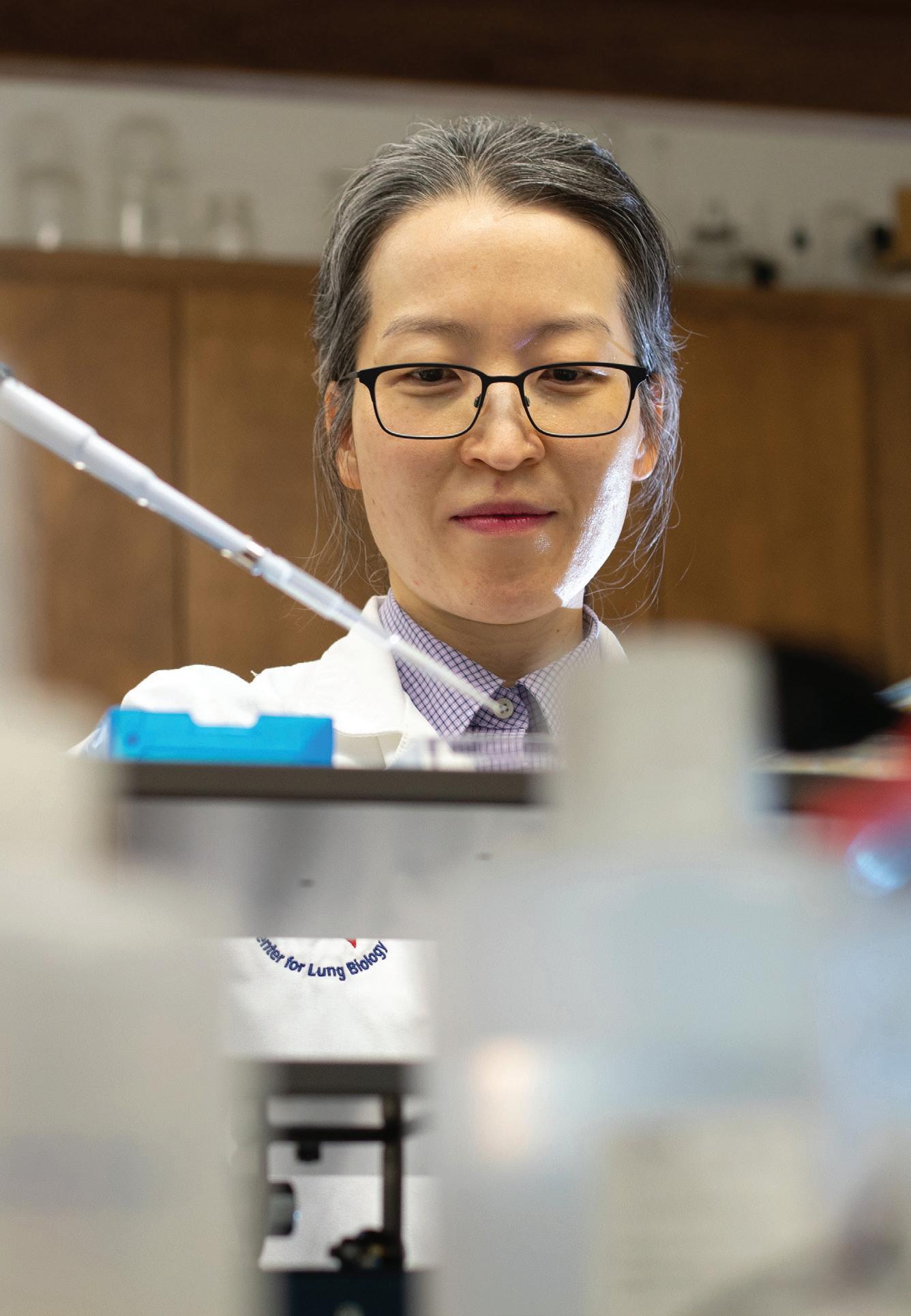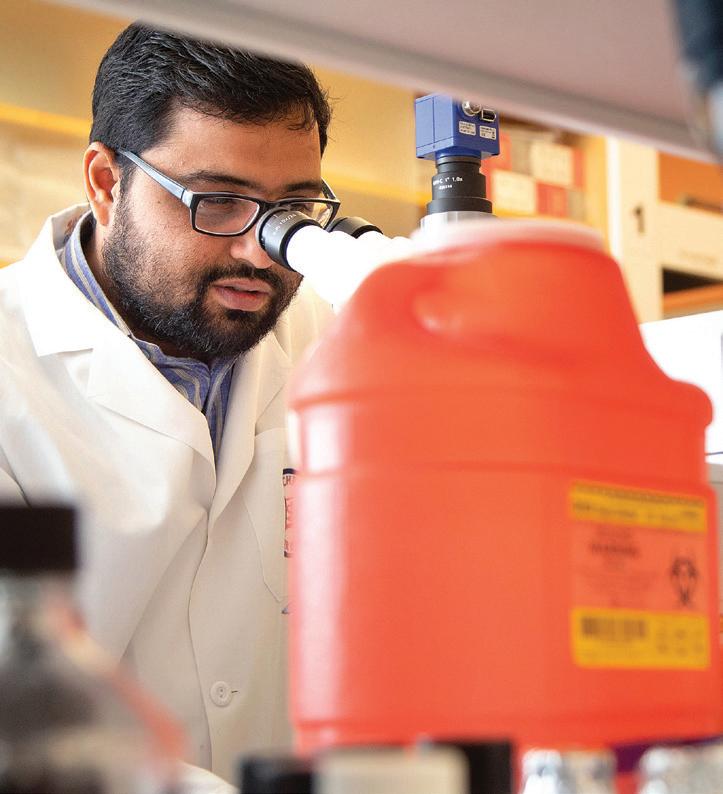
12 minute read
Research
Physician-scientist awarded $1.9 million grant to study acidosis in the lungs
Critically ill patients with pneumonia often present with excessive acid in their blood, a condition called acidosis. However, whether acidosis is a marker or a mediator of disease progression is still unknown.
Advertisement
Ji Young Lee, M.D., Ph.D., an assistant professor in the department of physiology and cell biology and the department of internal medicine at the Frederick P. Whiddon College of Medicine, received a grant from the National Institutes of Health (NIH), totaling $1.9 million over a five-year period, to study how the lungs handle acid.
Lee’s laboratory is examining the fundamental mechanisms of pH regulation in pulmonary endothelial cells. These cells, which line the blood vessels of the lungs, form a semipermeable barrier and regulate the exchange of fluids, gases and other substances.
“Findings from our study will help develop new diagnostic and therapeutic strategies for critically ill pneumonia patients,” said Lee, who also is a pulmonary and critical care physician with USA Health. “Since these patients often suffer from long-lasting complications even after discharge, as demonstrated by the COVID-19 long-haulers, we hope our work positively impacts both short- and long-term pneumonia outcomes.”
Lee, principal investigator of the project, is the recipient of the NIH’s Research Project Grant, also known as an R01 grant, which provides support for health-related research and development.
“As a researcher, it is a great honor that my work is supported by the experts in the field,” Lee said. “As a physician, it is a privilege that I can explore scientific questions that could potentially benefit my patients.”
Ji Young Lee, M.D., Ph.D., is studying the fundamental mechanisms of pH regulation in the lungs.
three $30,000 awards annually to Ph.D. students with Whiddon College of Medicine faculty as primary mentors. Jenny Hewes is looking at gender and pulmonary arterial hypertension (PAH) – a fatal, progressive disease characterized by high blood pressure in the arteries of the lungs. Rachel Rodenberg is focusing on herpes stromal keratitis (HSK), the leading cause of infectious blindness in developed countries. Reece Stevens is studying how carbonic anhydrase IX (CAIX) signaling protects the pulmonary endothelial barrier. Participants needed for NIH-sponsored research on long COVID USA Health is looking for people willing to take part in a nationwide study aimed at researching COVID with a goal of enhancing treatments and recovery from the virus. The study, sponsored by the National Institutes of Health, seeks people ages 18 and older, and doesn’t require participants to have been diagnosed with COVID. Participants may be asked to answer surveys every three months, have simple health exams twice a year, and give small samples of blood, saliva, urine, stool and nasal
Faculty uncover mechanism behind cognitive dysfunction after pneumonia

Ron Balczon, Ph.D., professor of biochemistry and molecular biology, and Mike T. Lin, Ph.D., associate professor of physiology and cell biology, are two of the study’s lead investigators.
Researchers at the Frederick P. Whiddon College of Medicine’s Center for Lung Biology are the first to describe pneumonia as a tauopathy – an abnormal aggregation of tau protein in the brain.
Short- and long-term neurocognitive dysfunction is common among critically ill patients who develop pneumonia, but the reasons behind this dysfunction are poorly understood. The dysfunction can present as impaired learning and memory, or as anxiety, depression and even post-traumatic stress disorder.
“Our recent work demonstrates that bacteria causes a tau protein found within the lung to become dysfunctional; it becomes cytotoxic to the lung and the brain,” said Troy Stevens, Ph.D., director of the USA Center for Lung Biology. “Dysfunctional tau moves from the lung through the circulation to the brain, where it impairs the physiological processes responsible for learning and memory.”
Stevens, who also is professor and chair of physiology and cell biology, said their studies suggest that cytotoxic variants of tau represent a novel therapeutic target during lung infection.
“Effectively removing the cytotoxic tau from the lung, the circulation and the brain may help the lung, brain and other organs recover from infection; and it may improve patient health in the aftermath of their illness,” he said.
Lead investigators of the study were Ron Balczon, Ph.D., professor of biochemistry and molecular biology; Ji Young Lee, M.D., Ph.D., assistant professor of physiology and cell biology; and Mike T. Lin, Ph.D., associate professor of physiology and cell biology.
Ticks may transmit leprosy to people, research suggests
For most of a century, researchers have explored the potential role that arthropods – such as ticks – play in the transmission of leprosy to humans and other animals, with little luck. Conclusive evidence hasn’t emerged on the topic in more than 80 years.
With that in mind, researchers from the Frederick P. Whiddon College of Medicine, in collaboration with the U.S. Department of Health and Human Services, have taken up the hunt.
The results from that collaboration suggest that ticks themselves might serve as the point of transmission for leprosy and that tick cells are suitable for maintaining a viable form of the disease for an extended period of time.
Perhaps best known from biblical references, leprosy is an infection caused by a bacteria found in the southern United States and elsewhere that spreads to animals, namely armadillos, and people. The majority of patients diagnosed with leprosy spend extensive time outdoors but only rarely report any direct contact with wild armadillos, said Natthida Tongluan, a graduate research assistant in the department of microbiology and immunology and lead author of the study.
The study aimed to assess the potential for ticks to transmit leprosy and to test if the disease could be maintained in tickderived cells. Researchers found that tick-derived cells were able to maintain viable disease during a 49-day course of infection, and the leprosy remained infectious within tick cells for at least 300 days.
NEWS BRIEFS
fluid one to two times a year. Participants will be paid for their time. For more info or to take part in the study, contact Rosanne Wilson, C.R.N.P., at 251-219-4324 or covid19research@health. southalabama.edu. USA National Alumni Association recognizes USA Health The University of South Alabama National Alumni Association honored USA Health as a community partner during the 17th annual Distinguished Alumni & Service Awards in March. Since the early days of the COVID-19 pandemic in 2020, USA Health has been on the front lines of the crisis, caring for sick patients at its hospitals and also partnering with the City of Mobile to establish drive-through testing and, later, vaccine centers and offering protection to residents of nursing homes and correctional facilities. Medical students present at M3 Case Report Symposium Rising fourth-year medical students at the Whiddon College of Medicine presented interesting, rare and novel case studies from their third-year rotations at the annual M3 Case Report Symposium on May 27. The symposium, organized by
Cancer and DNA damage: Discovery may improve patient outcomes
A discovery made by Frederick P. Whiddon College of Medicine scientists may provide further understanding of genes and factors that cause cancer, thereby improving treatment options for patients.
The study explores how the human genome constantly is damaged by environmental and cellular products, which could lead to cancer if not properly repaired.
Robert W. Sobol, Ph.D., professor of pharmacology at the Whiddon College of Medicine and chief of the Molecular and Metabolic Oncology Program at the Mitchell Cancer Institute, is the lead author of the study, which delves into treatments for DNA damage and repair.
Genomes, composed of DNA, are a complete set of genetic instructions. Each genome contains all the information needed to build an organism and allow it to grow and develop. It is critical for cells to keep the genome intact. This is the main function of more than 200 genes that are part of the cellular pathways governing DNA damage and repair.
The goal of the study is to learn more about these critical proteins and how they respond to DNA damage.
“This breakthrough research uses state-ofthe-art microscopy and genetic techniques to follow the movement of key base excision repair pathways and their response to damage, which could be beneficial for patients,” Sobol said. “Future studies can build on this discovery as we continually work to identify additional genes and factors that are defective or that may be considered biomarkers of response related to cancer.”
Nicotine weakens immune system, USA researchers find
Scientists at the Frederick P. Whiddon College of Medicine and the Mitchell Cancer Institute found that nicotine, the addictive ingredient in tobacco products and cigarette substitutes, plays a novel role in immunosuppression. The findings highlight the health hazards of nicotine intake including an enhanced susceptibility to developing cancer.
Sirin Saranyutanon, Ph.D., a recent basic medical sciences graduate, investigated the effect of nicotine on macrophage polarization, growth and invasion to understand its role in human physiology. Macrophages are an important component of the innate immune system that can have both pro- and anti-inflammatory functions depending upon their polarization state.
“Our findings suggest that nicotine weakens our immune system by altering the function of macrophages, and converting them from defenders to the type that helps resolve protective inflammatory response and support tumor growth,” Saranyutanon said.
The findings add to the growing concern about the use of nicotine, said Ajay Singh, Ph.D., professor of pathology at the Whiddon College of Medicine and program leader of Cancer Biology and Cancer Health Disparities at the MCI.
“The use of nicotine through vaping has increased tremendously in recent years, especially among teens, owing to the belief that it’s less damaging than smoking,” Singh said. “Being a relatively newer trend, epidemiological data associating vaping with slow-developing diseases like cancer is not yet available. However, our findings should raise awareness about the harms that it can cause to human health.”

Researchers Srijan Acharya, Ph.D., left, and Sirin Saranyutanon, Ph.D., study the effects of nicotine at the Mitchell Cancer Institute.
medical student Samuel Thomas, drew 55 entries on cases involving a variety of diagnoses from cancer to infectious diseases. Winners were Matthew Joyner, first place; Kasey Andrews, second place; and Donavon Dahmer, third place. MCI accredited by the Commission on Cancer The Mitchell Cancer Institute once again has earned a three-year accreditation from the Commission on Cancer (CoC), which recognizes excellence in the delivery of comprehensive, patient-centered cancer care. The oncology program at USA Health has been accredited since 1976, including the MCI since it opened in 2008. To earn the accreditation from the CoC, established by the American College of Surgeons (ACS), a cancer program must meet 34 quality care standards, be evaluated every three years through a survey process, and maintain levels of excellence in comprehensive care.
Residents, fellows compete in 2022 scholarship exposition Residents and fellows at USA Health presented their scholarly activities from case reports, research projects, quality
Researcher studies racial disparities in cervical cancer prevention
Santanu Dasgupta, Ph.D., a cancer researcher at the Mitchell Cancer Institute, received a $126,000 grant from the Elsa U. Pardee Foundation to identify stressrelated factors that contribute to the initiation and progression of cervical cancer.
“In the United States, cervical cancer causes significant mortality in racially disparate women living under constant socioeconomic stress. In fact, the mortality rate for cervical cancer is the highest in Alabama and continues to rise every year,” Dasgupta said. “Our goal is to identify the early epigenetic changes in cervical cancer to help in risk assessment and develop improved prevention strategies in these women.”
Dasgupta, an assistant professor of pathology at the Whiddon College of Medicine, is the principal investigator of the project. “My long-term goals are to identify specific factors relating to high mortality due to cervical cancer in our region and work in collaboration to reduce the existing disparity gaps,” he said.
The study will be conducted in collaboration with Ajay Singh, Ph.D., professor of oncologic sciences at the MCI and professor of pathology and biochemistry and molecular biology at the Whiddon College of Medicine; and Jennifer Young Pierce, M.D., M.P.H., a gynecologic oncologist, head of the cancer control and prevention division at the MCI, and professor of obstetrics and gynecology at the Whiddon College of Medicine.
The Elsa U. Pardee Foundation awards one-year grants for research projects devoted to the prevention, detection and treatment of cancer.
Scientists find novel mechanism underlying metastatic prostate cancer

Mohammad Aslam Khan, Ph.D., a senior research associate at the Mitchell Cancer Institute, is one of the project’s lead investigators.
Researchers at the Mitchell Cancer Institute and the Whiddon College of Medicine uncovered a novel mechanism that underlies castration therapy resistance in metastatic prostate cancer.
Patients whose cancer has spread beyond the prostate gland receive a type of hormone therapy, known as androgen deprivation therapy or castration therapy, as a first line of treatment. However, most patients with metastatic prostate cancer undergo relapse, and the cancer comes back in a more aggressive castration-resistant form. This type of prostate cancer also does not respond favorably to alternative therapies, eventually leading to the patient’s death.
“Our findings unfold a novel mechanism underlying the failure of castration therapy and identify MYB, a protein-coding gene, as a target of interest,” said Mohammad Aslam Khan, Ph.D., a senior research associate at the MCI and one of the project’s lead investigators. “We show that MYB supports the growth of prostate cancer when subjected to castration therapy by interacting and sustaining the transcriptional activity of the androgen receptor.”
Khan said their findings would push for the development of novel therapeutic approaches that either directly target MYB or block its interaction with the androgen receptor. “MYB also may be used as a biomarker to predict the response of patients to castration therapy beforehand, thus saving patients from unnecessary treatment and financial burden,” he said.
NEWS BRIEFS
improvement projects, and patient safety, education and advocacy projects at the USA Resident and Fellow Scholarship Exposition on June 16. Winners in the poster presentation categories were Jonathan Jones, M.D., OB-GYN resident; Chaitra Manjunath, M.D., pediatrics resident; and Katie Vines, M.D., surgery resident. Oral presentation winners were Benjamin Eisenman, M.D., family medicine resident; Jorge Sucar-Marquez, M.D., pediatrics resident; and Joseph Anderson, M.D., orthopaedic surgery resident. Medical students take part in summer research This year, 57 medical students, 12 of whom are incoming first-years, participated in the Whiddon College of Medicine’s Summer Research Program, which culminated on July 22 with the 49th annual Medical Student Research Day. The program matches incoming first-year medical students and rising second-year medical students with basic science and clinical faculty researchers. The summer experience includes hands-on research, a seminar program that focuses on various scientific and clinical topics, and student presentations.






